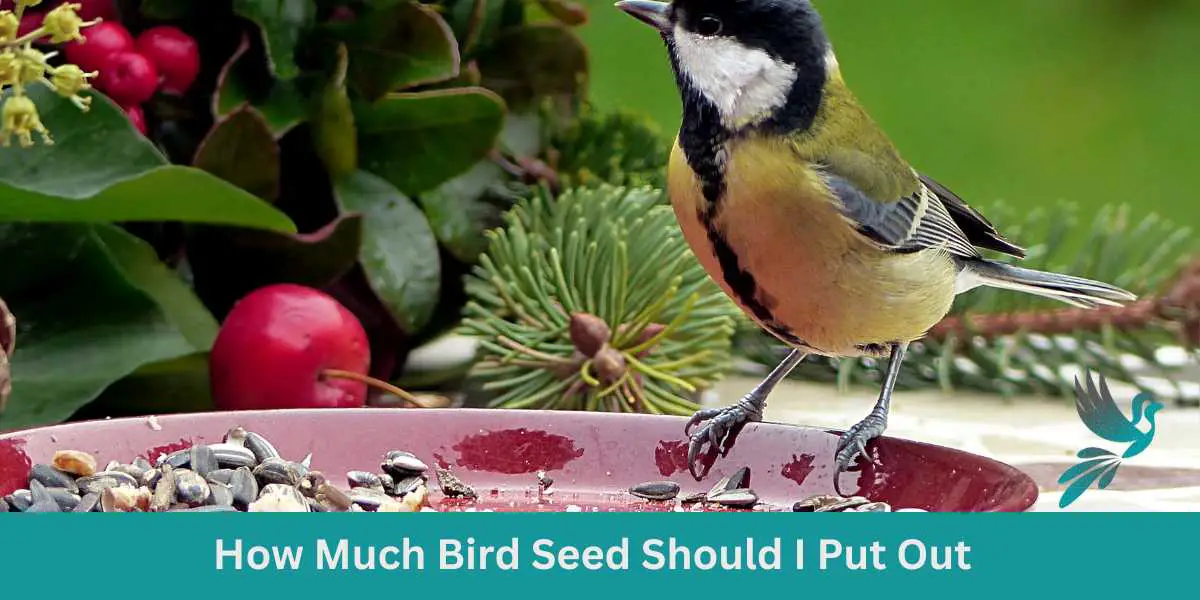Are you a bird lover who enjoys feeding your backyard birds? If so, you’re not alone! Many of us find joy in providing our feathered friends with a steady supply of food. But have you ever wondered if you’re feeding them the right amount of bird food?
As it turns out, it’s not just about pouring some seed into a feeder and calling it a day. There are a few things to consider when determining the right amount of bird seed to provide.
In this post, we’ll take a closer look at why it’s important to get it right and how you can ensure your birds get the right amount of food. So, let’s get started!
Key Takeaways on Feeding Backyard Birds
- Feeding birds with food is important to sustain their energy levels, attract them to the garden, and support population growth.
- When you feed birds, consider the species, season, and food availability. Remember some small birds require regular feeding, while others need more during breeding or colder months.
- Bird feeders should be refilled regularly to keep the birds visiting back; weekly is a good rule of thumb.
How often do garden birds eat?
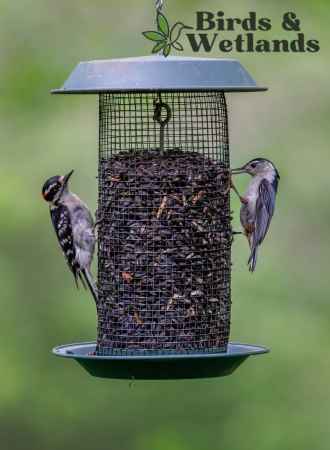
Many people feed wild birds in their yards and gardens, and these animals rely heavily on their diet to survive. Generally, most garden birds feed several times a day, but this can vary depending on the species, season, and food availability.
Most birds have high metabolic rates, meaning they must frequently eat to maintain their energy levels. In the wild, birds often feed on small insects, cracked corn, worms, and seeds that are rich in nutrients and caloric value.
During the breeding season, many bird species have increased feeding rates as they need to produce more energy to support their young. Similarly, during the winter months, when food is scarce, many birds will increase their feeding rates to maintain their body temperature and stay alive.
It’s important to note when bird feeding is that different bird species have different feeding habits. Some birds, like robins and thrushes, prefer to feed on the ground, while others, like blue tits and finches, prefer to feed on hanging feeders. Some birds, like blackbirds and starlings, are omnivorous, feeding on various foods, while others, like goldfinches and siskins, have more specific diets, feeding almost exclusively on seeds.
Generally, it’s a good idea to provide birds with foods regularly, especially during the winter when natural foods are scarce. Most garden birds will appreciate a consistent food supply, and regular feeding can help to attract a variety of bird species to your garden.
However, it’s important to be mindful of the types of food you provide, as some foods can be harmful to birds. For example, bread is often fed to birds but is not a nutritious food for them and can cause health problems in the long term.
How often should you refill your feeders?
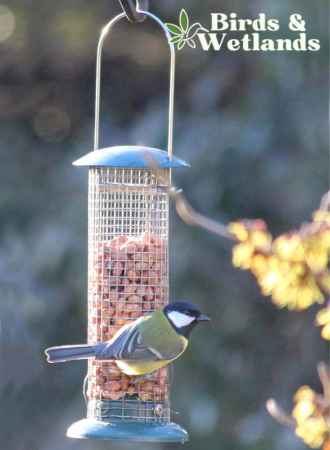
Bird feeders are a great way to attract birds to your backyard, but it’s important to ensure that the feeders are filled regularly to keep the birds coming back. The frequency at which you need to refill bird feeders depends on several factors, including the feeder size, the type of bird seed you’re using, and the number of birds that visit your feeder.
As a general rule, you should aim to refill your bird feeder at least once a week. This will ensure that there is always fresh food available for the birds, and it will help to prevent the spread of disease. If you have a small tube feeder, it would only take just a few hours before it becomes empty.
If you have a larger feeding station or if you have a lot of birds visiting your feeder, you may need to refill it more frequently. Moreover, a high capacity feeder with a very selective style of offering more specialized food can take days before it gets emptied. Remember birds are naturally curious and once a bird sees other birds around feeders, it will join them.
When refilling your bird feeder, it’s important to clean the feeder thoroughly first. This will help to prevent the spread of disease and ensure that the birds are not eating contaminated food. You should also try to use fresh bird foods whenever possible, as spoiled seed can attract unwanted pests like mice and squirrels and birds won’t eat wet seed.
How much do backyard birds eat?
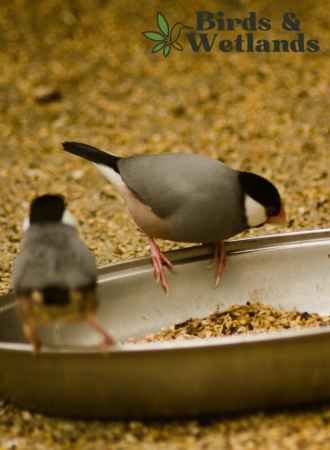
In general, most garden birds require a diet that is high in protein and fat to maintain their energy levels and support their daily activities. Some common natural food sources for birds include seeds, nuts, fruits, insects, and small invertebrates like worms and snails.
The amount of food that a bird eats depends their size and activity level. Smaller birds like finches and sparrows may only need a few black oil sunflower seeds or insects each day, while larger birds like jays or woodpeckers may require more substantial meals to fuel their higher energy demands.
During the busy breeding season, many birds will also require additional food to support their growing young. This can include a higher quantity of protein-rich insects or mealworms, as well as foods that are rich in calcium to support the development of strong bones in their offspring.
To attract and support a diverse range of birds, it’s important to provide a variety of food sources and to keep feeders and feeding areas clean and well-maintained. Many bird experts recommend providing a mix of different seed types, as well as suet cakes, mealworms, and other high-protein options, to ensure that birds have access to the nutrients they need throughout the year.
What is the importance of putting out the right amount of food for birds?
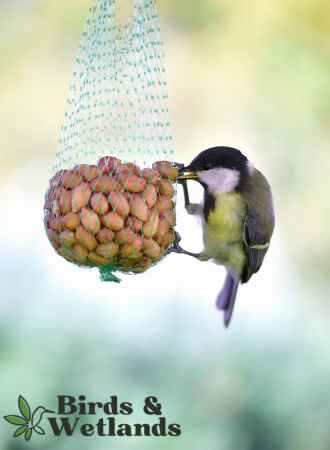
Putting out the right amount of food for birds is important for several reasons. Birds are an essential part of the ecosystem and play a crucial role in maintaining a balance in the natural world. By feeding them, we not only help them survive but also contribute to the environment’s overall health.
One of the most significant benefits of providing the right amount of food for birds is that it helps them to maintain healthy body weight. Like humans, birds can suffer from obesity and other weight-related health issues if they consume too much food.
On the other hand, they can become malnourished and weak if they don’t get enough food, making them vulnerable to diseases and other threats.
The right amount of bird food can also help to reduce competition for resources. When birds have access to an abundant food supply, they are less likely to fight or compete with each other for it. This reduces stress levels and creates a more harmonious environment for all the birds in the area.
Furthermore, by providing food for birds, we can help to support their population growth. As natural habitats continue to be destroyed by human activity, birds are often left with limited food sources. By providing food for them, we can help to ensure that their population remains stable and healthy.
However, it’s important to note that providing too much food for birds can also have negative consequences. Overfeeding can lead to an increase in bird populations, which can cause damage to crops and other vegetation. It can also attract predators to the area, which can pose a threat to the birds themselves.
Additional Tips on Bird Feeding
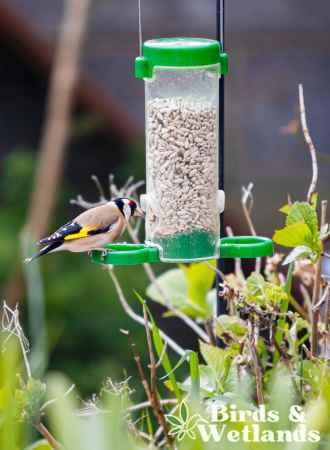
- Use tray feeders or platform feeders if you want birds to grab bird foods and fly in.
- Refill empty feeders in early morning before birds start feeding.
- If you multiple feeders in your yard, you can leave an empty feeder as long as others have been recently refilled.
- Feeders will not go empty quickly as long as birds spread to different feeders.
- If you plan to provide nyjer seed or white proso millet mixes to birds, get them from a reliable supply store and use tube feeders.
- You can leave feeders empty, birds will search for other sources of natural foods or visit other feeders around your neighborhood.
- Clean your feeding stations and remove any uneaten or unwanted seeds to prevent attracting raccoons, squirrels and other backyard pests.
- If you want to attract more birds, place higher-capacity feeder or more than one feeder to feed the birds in your yard. Larger feeders offer more feeding times than a smaller feeder or a single feeder.
- Choose no waste seeds to minimize seed tossed on the ground as birds pick their favorite seeds.
- Prevent window strikes by placing feeders away from windows.
- Place feeders where birds can easily fly for cover if they feel threatened and in areas that attract them the most. For instance, you can put a new feeder near tree trunks to attract woodpeckers and nuthatches.
- Choose feeders with large capacity and place more feeders filled with various foods.

